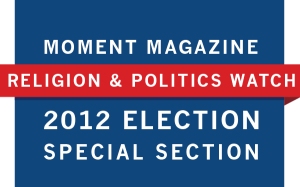By Caitlin Yoshiko Kandil | Jan 27, 2012
The Center for American Progress in Washington, DC hosted a forum earlier this week on “God and Politics: Examining Religion in the 2012 Religion.” Jews were never mentioned in the 90-minute talk, but speakers raised some illuminating points about the country’s religious voters:
- Changing Demographics: The white mainline Protestant population is in decline, says Robert Jones, CEO of the Public Religion Research Institute. While the Catholic population has been steady, the demographics are shifting—the number of white Catholics is dwindling as Hispanic Catholics are on the rise. These racial divisions are also reflected in voting patterns: non-white Christians voted heavily for President Obama, while white Christians were split.
- Evangelicals and Mormons: Almost half of white evangelicals—49 percent—say Mormonism is not a Christian religion, slightly higher than the 47 percent who say they would be uncomfortable with a Mormon president, according to PRRI surveys. Even factoring in other factors like Mitt Romney’s moderate social views and his work at Bain Capital, Jones says, “In the data, we see a consistent sign that his religion, particularly among evangelical voters, is still playing an independent role.”
- More Believe Obama is Muslim: Forty percent of Americans still say they don’t know Obama’s religion, and 18 percent say he’s Muslim. “That number has actually gone up from 12 percent since he’s come into office,” Jones says.
- Religion and Favorability Rating: Jones explains the strong correlation between perception of religious difference and favorability rating: Of the 51 percent of Americans who say Obama’s religion is at least somewhat different than their own, only 7 approve of him. Similarly, those who say Mormonism is very different than their own religion favor Mitt Romney 20 percentage points below those who say Mormonism is similar to their own.
- What All Religions Agree On: Six in ten Americans agree with the statement, “Society would be better off if the distribution of wealth was more equal.” Every major religious group agrees despite a stark partisan divide.
- Trouble for Obama: Obama could lose this fall, says Shaun Casey, professor of Christian ethics at Wesley Theological Seminary. But only if four circumstances come together—evangelical voters show up in record numbers, white mainline Protestants and white Catholics sit this election out, Obama’s campaign has poor religious outreach, and if the Catholic bishops voice their discontent with the White House. “If you have those four, then the president could be in very big trouble,” he says.
- Hispanic Vote: Gabriel Salguero, president of the National Hispanic Evangelical Coalition, says Hispanic evangelicals could be swing votes in several states this year. “The question, I think, is, are they voting around the immigration reform issue, or are they going to vote with their sisters and brothers in the wider evangelical communities around social conservative issues?”
- Religious Intolerance: Since the anti-Catholic backlash against John F. Kennedy in the 1960s, “religious intolerance has mutated,” says Casey. “Now the targets are different, and they’re harder to detect because people have more social pressure to not admit it to a pollster. We do know that if you’re a Muslim, a Mormon, or if you’re unaffiliated, you’re in deep trouble if you’re running for elected office in the United States.”
- Historic Anti-Mormonism: “This meme of Mormons not being trustworthy, of being secretive, of not being fully assimilated into the United States—this has been with us for more than a century,” says religion scholar and journalist Joanna Brooks. “So what Mitt Romney is working out and working through right now is more than a century in the making.”

